Shaolin Wooden Men (1976)
Directed by: Chen Chi Hwa
Written by: Hsin Chin
Starring: Chang Ping-Yu, Chun-Erh Lung, Jackie Chan, Kang Chin
AKA SHAO LIN MU REN XIANG
HONG KONG
AVAILABLE ON BLU-RAY AND DVD
RUNNING TIME: 106 mins
REVIEWED BY: Dr Lenera
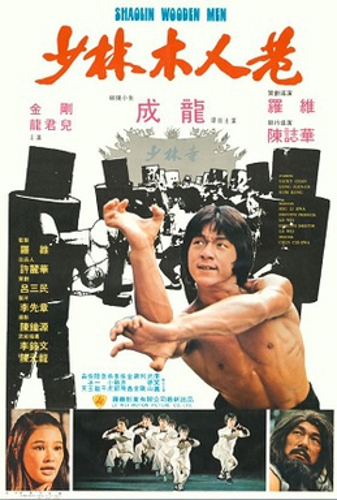
At the Shaolin Temple, Dummy [or Little Mute in the subtitled version] struggles to keep up with the other students and is haunted by the memory of his father’s murder at the hands of a masked bandit who was skilled in martial arts. But before he can avenge this, he needs to pass the test of the Wooden Men Alley, a narrow hallway containing thirty-six mechanical wooden dummies that attack anyone who enters. So he begins to be taught not just by one but by two very different teachers with two very different fighting philosophies; a violent prisoner chained up in a secret cave behind a waterfall who tells Mute to pass on a note when he’s completed his ordeal, and a pacifist nun….
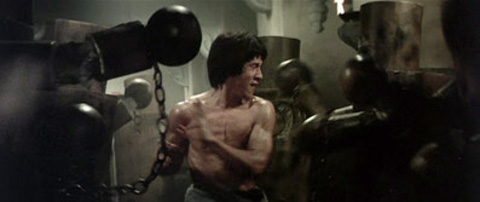
Producer Lo Wei’s attempt to replicate the Shaw Brothers period martial arts movie by the likes of Chang Cheh and Lau Kar-Leung, Shaolin Wooden Men was a film I remembered as being one of my favourites of Chan’s Wei era, an era generally looked down upon by Chan’s fanbase but one that seems to me to be rather better than I used to think seeing the films with a critical eye and decent picture quality courtesy of 88 Films. And, viewing it again, it remained a good watch, easily the best of the three Chan films I’m reviewing this week [and there’ll be a fourth in January which will be of a new movie]. It holds off on actual fighting – or at least fighting where humans are battling other humans – until half way through, but that’s fine because there’s a lot of training and a lot of laughs, some of the latter seemingly not intentional but does that really matter in this genre? Part two certainly piles on the action, which isn’t outstanding but is certainly decent and diverse in nature, and the plot is solid, being not entirely predictable nor overly convoluted like it can be in some of these movies. The one major thing that jars is Chan. While certainly giving it his all martial arts-wise, perfecting the five main animal stances and doing enough leaps and ducks to more than hint at the Chan to come, he seems uncomfortable in his stoic, silent role, and quite frankly didn’t have the presence at the time to pull a non-speaking part off, though he’d do much better with a serious part two years later in Dragon Lord.
So New Fist Of Fury flopped, but to his credit Wei didn’t give up on Chan, putting him in several successive films even if they weren’t all suited to him. Chen Chi-Hwa Wei is credited as director of this one from a script by Hsin Chin, though it’s often said that credited ‘executive director’ Wei was the one calling the shots. Saying that though, it does have a different feel to the Bruce Lee sequel so who knows for sure? Chan called this “his first dream project”, probably because he was allowed to choreograph his action, though he would sometimes begin to incorporate comedic bits before discarding them knowing that Wei would not be pleased. The first edit was deemed unsatisfactory by Wei for reasons unclear, so he hired another editor to put together another one. The original release was a minor flop, so a 1980 re-release [cashing in on Chan’s belated stardom] cut it down [the original running time is unknown] to 106 minutes which became the basis for the export version; the full cut seems to be lost. Information is scant on what was removed, though there are noticeable edits in sometimes odd places and music jumps if you play the Mandarin audio including during the final duel; the Cantonese and English language soundtracks are fine though. Home release versions have differed; the French DVD cut seven minutes of dialogue, some English and an American video and DVD versions removed the first ten minutes because the audio had badly deteriorate, and the Hong Kong Legends DVD employed new voice artists for those ten minutes. The oft-used Wooden Men became the inspiration for the character Mokujin in the Tekken series, and Kill Bill Vol. 1 had three references from this film.
Many martial arts pictures of the time opened with a lengthy display of skill by the star in between the opening credits, and this one showcases Chan’s perfection of the Dragon, Snake, Tiger, Leopard and Crane stances as he fights several monks in turn in a darkened room lit only by candles on both sides. Then he’s seen battling the Wooden Men and not doing too well; however it was just a dream. Dummy doesn’t like to get up and is mocked by the other students because he’s just not very good at his tasks, which in this case means struggling having to bare on his shoulders two large and full buckets of water hanging from a beam up lots of steps, something which “takes practice” though eventually his “body will glide”. He’s then ordered to chop wood and one of the senior monks who always seems to be going at the booze stumbles upon him and shows off what’s basically a forerunner to Drunken Boxing. How cool is this? – though I don’t remember the style involving the remarkable body bending that you see here. Dummy is enthralled and even does some himself, but his real teachers are going to be others. One is this rude, shouty guy imprisoned by the monks who demands that Dummy bring him food and drink [including his friend’s wine, that’s asking for trouble!] in return for training him – which he does while chained up, leading to some daft moments. He believes a martial artist should, “always attack, and violently too. Now the head is a good place to start”. Opposite to this is the philosophy of his other teacher, a somewhat mysterious nun. To her, martial arts are more about well being and balance, and one should only fight in defence. The extent of her training seems to be to get Dummy not to fall over in a pit of grease, something she calls the Technique of the Winding Snake.
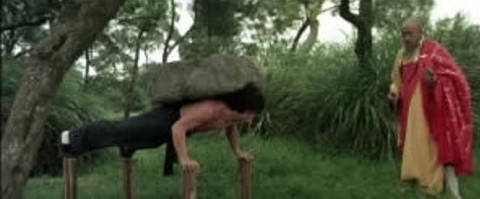
It’s interesting having somebody who’s quite obviously a villain teaching our naive hero, and, even if things aren’t exactly action packed for the first half an hour there’s still much to enjoy. We do see another student try the Wooden Men; he fails. Finally Dummy is ready and we’re treated to an incredible display of skill by Chan in what is easily his best scene to date. He kick, punches, jumps, crawls, does everything to avoid his opponents. The Wooden Men don’t convince much as these elaborate variant on the traditional training dummy; it’s obvious that we’re watching people inside thin suits, and one wonders how many monks would be required to operate them, but the virtuosity on offer from Chan more than makes us for this. And then he has to move a boiling cauldron that gives him blisters; I’d have thought nobody would be able to do this without severe injury, but never mind, I’ve seen similar things in other films too. Dummy has been told by his prisoner trainer to take a note to the ‘Crippled Chemist’, whom he finds really easily of course. The area is being terrorised by the Green Dragon gang. Dummy first comes up against them when defending a woman’s honour in a tavern, but he’s really looking for his father’s killer. At the same time his imprisoned teacher, now sporting a wig that looks just like a furry hat, has escaped [which disappointingly we don’t see] and begins to slaughter all the people in the local martial arts schools while Dummy has to be trained by a third person who also has history with the Shaolin Temple. He’s soon doing press-ups with a papier mache rock on his back, though I shouldn’t mock: we also see him doing upside down press-ups and jumping forward as he does, so, shot so that you think somebody may be helping him before the camera pulls back to reveal he’s doing it on his own.
Even though the unnamed [like most of them] character played by Doris Lung Chun-Ah seems to be kidnapped and then released with little reason and then totally disappears, the storyline is reasonably well worked out, and there’s fighting with weapons and without. A staff battle on an open field where the escaped teacher [only Chan’s character seems to have a name] is surrounded by loads of monks is a real highlight; it’s both exciting and visually pleasing especially the way that the monks keep on forming patterns, and probably the closest an early Chan scene comes to a dance number in a musical. An exchange between a staff and a nunchuku is promising but is over before it even gets going. The tavern fight is where the most signs of the future Chan can be spotted with 20 seconds or so of use of the environment and agile evasive action. As long as you appreciate that it’s quite formal – we all know that Chan only truly came into his own when he broke away and incorporated more and more of his own thing – the final fight is solid, with the first employment of one of Chan’s favourite techniques; rolling backwards and kicking his opponent. There’s also a great bit when the bad guy’s two henchmen step in so their boss can take a rest; normally they’d attack right away. However, the sequence suffers from some awkward editing which seems to have no rhyme or reason; we even get some jump cuts which disrupt the rhythm of the fighting. Obviously it was cut down, but it looks like it was done randomly and it’s really rather strange. Nonetheless, for those who want to see Chan as a ‘serious’ or even ‘proper’ martial artist on screen with very little of what they may call ‘silly stuff’, Shaolin Wooden Men is an excellent showcase for that. Chan looks great performing it to; it’s just a shame that in-between he looks ill at ease, especially when constantly bowing to people.
The standard of acting overall is quite good in this one; I especially like Wu Tu Shung as the alcoholic student [heavy drinking is often portrayed as not a bad thing in this genre]; he has a great glint in his eye and doesn’t overdo the drunken mannerisms, And Chang Ping-Yu as Dummy’s second teacher has an unusual, enigmatic, presence. Yuen Biao is sometimes seen as a henchman and it looks like Hwang Jang-Lee is briefly in it too. Chen Chi-Hwa went on to direct Chan’s Snake And Crane Arts Of Shaolin and Half A Loaf Of Kung Fu. He rather overuses fast zooms, though the somewhat disturbing [ even if we see little detail] flashbacks which use sepia and a stretched image are a nice stylistic touch. There are also some nice pastoral images of the monks going about their business, an effective superimposing of two different training sessions in one shot, and even a picturesque ‘magic hour’ scene; cinematographer Chung-Yuan Chen does a nice job throughout. A few bloody moments unsurprisingly appear and there’s even a scene where the main bad guy kills a man because he mistook him for a monk with his shaven head, then his friend, then the friend’s little boy; we only see him kick the boy but it’s still an intense scene of the kind you tended not to see in Chan soon after, even if for some reason Chan’s character just stands there and lets it happen! Shaolin Wooden Men has more music than any of the other Chan Wei’s. ‘Composer’ Chou Fu-Liang compiled some nice music of both a serious and a more lighthearted [despite the generally serious tone of the film] nature with a rather rousing triumphant theme [entitled ‘The Harvest Song’ from the opera ‘Song of the Dragon River’] which is sadly not used in the climax. Shaolin Wooden Men is no classic of the genre but is quite pleasing and they obviously tried to give matters some freshness, like the ending. It’s unusual to see an apology during a final fight – yet it works here. Soon after this Wei told Chan to get a nose job because he thought he was too ugly to be a star. Not very nice – though maybe it did actually help?





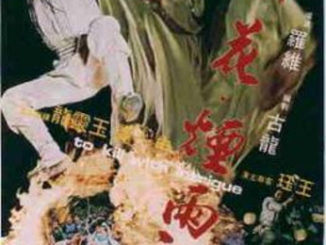
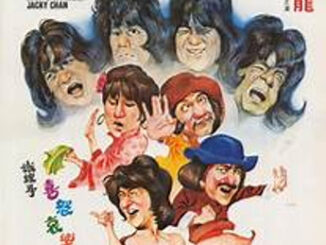
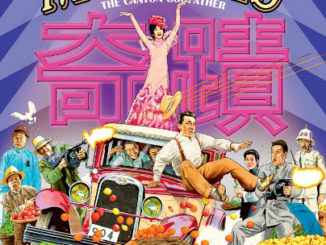
Be the first to comment